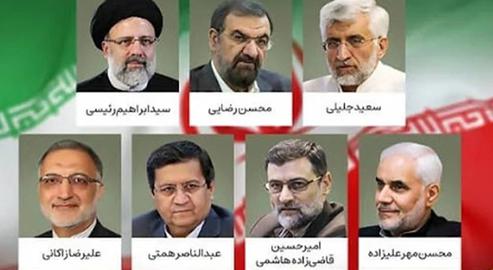The second round of TV debates between Iran’s presidential candidates was largely the same as the first, but the atmosphere was calmer. Although the hardliners and quasi-reformists continued to attack each other as expected, the language they deployed was different.
In the second debate on Tuesday afternoon, Abdolnasser Hemmati and Mohsen Mehr Alizadeh again tried to introduce themselves as representatives of Iran’s reformist camp. They also did their best to encourage the up to 60 percent of the population planning to boycott the vote to change their minds.
Among the key issues they raised were "hijab text messages" – threatening texts being sent by Iran’s morality police to non-observers of hijab – and the "Islamic Guidance Patrols", together with internet filtering, music, the JCPOA and the pervasive influence of the Islamic Revolutionary Guard Corps on Iran’s economy.
For their part, the principalists refused to engage on these topics. Ebrahim Raisi and Alireza Zakani instead focused once again on “fighting corruption” and attacking Hassan Rouhani, while Mohsen Rezaei reiterated his vague economic promises. Saeed Jalili and Amir Hossein Ghazizadeh Hashemi were less involved in the discussion and limited themselves to describing their governance plans.
Hemmati and Mehr Alizadeh also made a point of criticizing Raisi for adopting what they said was a threatening, paternalistic position. This had included calling them “employees” of outgoing premier Hassan Rouhani. In response, Raisi followed the same procedure as he had in the first debate and pretended to be victimized. But he also did not hesitate to denounce the two candidates for “anti-regime” approaches.
Not only is Raisi unlikely to have increased his share of the vote since the first debate, but it may even have been reduced. The chief justice of Iran has long expected to be the stand-out candidate and is presumably still hoping Hemmati will not be able to close the gap.
Raisi also boasted about his tours of the country and the actions taken by his office. But even some of his supporters have now expressed concerns that he has no concrete plans for leadership, unlike, say, Mohsen Rezaei. In response, after the debate, Raisi’s office declared he would be putting forward concrete economic proposals “in the coming days”.
Meanwhile, according to the polls, some principalists appear to be drifting toward Saeed Jalili on the basis that he “has a plan”. Even Ghazizadeh Hashemi has seen his ratings creep up after the recent debates.
If the 2021 presidential election ends up mirroring that of 2005, as it now looks like it might, a few hundred thousand votes could change the course of Iran’s history. If Jalili and Ghazizadeh Hashemi do not withdraw, Raisi may be left exposed. And if no candidate achieves a majority and the vote goes to a runoff, Raisi’s opponents will stand a much better chance.
Meanwhile, Hemmati and Mehr Alizadeh, although hopeful, still do not sincerely believe they have a chance due to the projected low turnout. Instead, they have tried to present themselves as embodiments of the 60 percent – to the point that Hemmati dismissed the other candidates’ arguments as only relevant to the 40 percent.
In the second debate, Mehr Alizadeh also addressed the people directly: "If your vote does not have an impact, then why did they limit your options in the election and do everything possible to make ‘a certain person’ president?"
Hemmati also stressed that the presidential election should not be not a choice between bad and worse, but a choice between having room to breathe in the political atmosphere and closing the doors completely.
The pair also again called Raisi the main candidate of Iran’s conservatives and rubbished the others as “cover candidates”. But Alireza Zakani also called Hemmati a "cover" candidate who, he said, was there to "cover" for the performance of Rouhani. Mohsen Rezaei also snapped back that he was not a “cover candidate” and would not be withdrawing for anyone.
Zakani also tried to distance himself from the conservatives in the second debate, attacking Hemmati and the Rouhani administration with less force than before. It might be that the MP is still hoping to position himself as the people’s second choice, through a combination of both economic promises and gestures toward Iran’s ethnic minorities. less.
Despite all that was said, the second debate did nothing to bring about a change in the overall pre-election mood. According to figures collected by the Iranian Students Polling Agency, just three out of 10 eligible voters in the country even tuned in to the first debate. These televised slanging matches are not the only decisive factor in elections; on the contrary, in Iran, the major changes usually take place below the surface. But there are no signs of these happening either.
Related coverage:
Talking About Women: How Iran’s Presidential Candidates Tried to Woo the Electorate
Amid Old Jokes and Fake Tears, Hemmati Outshines Raisi in the First Presidential Election Debate
Abdolnasser Hemmati: Runaway Hit or Too Little, Too Late?
Iranian State TV Censoring Presidential Campaign Videos
"Father is Very Kind": Viewers' Disbelief at Claims by Raisi's Daughter on TV
Faezeh Hashemi: This is Not an Election, It’s an Appointment
visit the accountability section
In this section of Iran Wire, you can contact the officials and launch your campaign for various problems

























comments